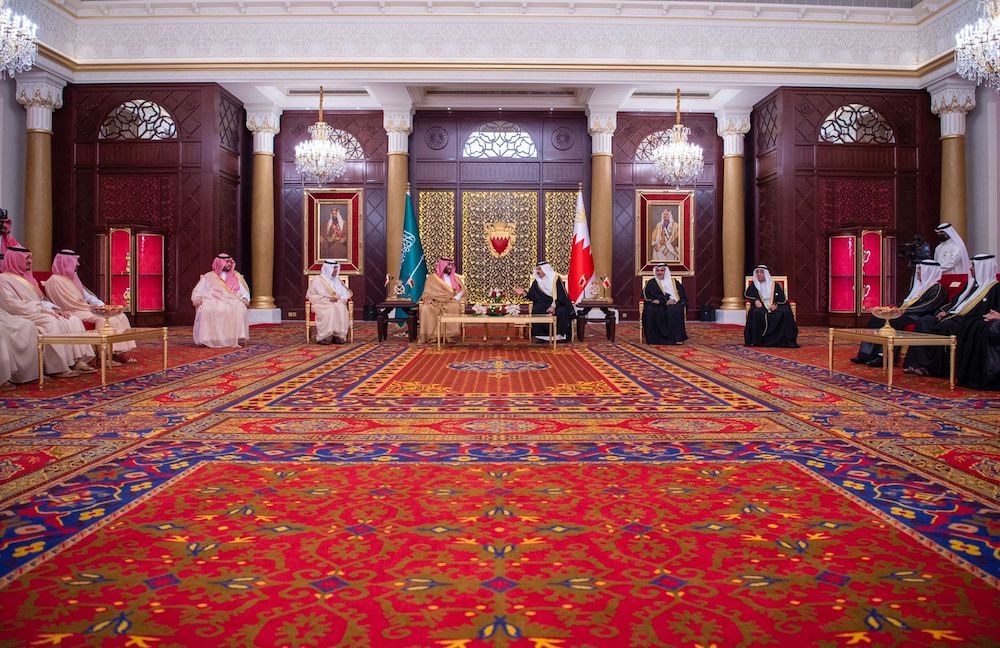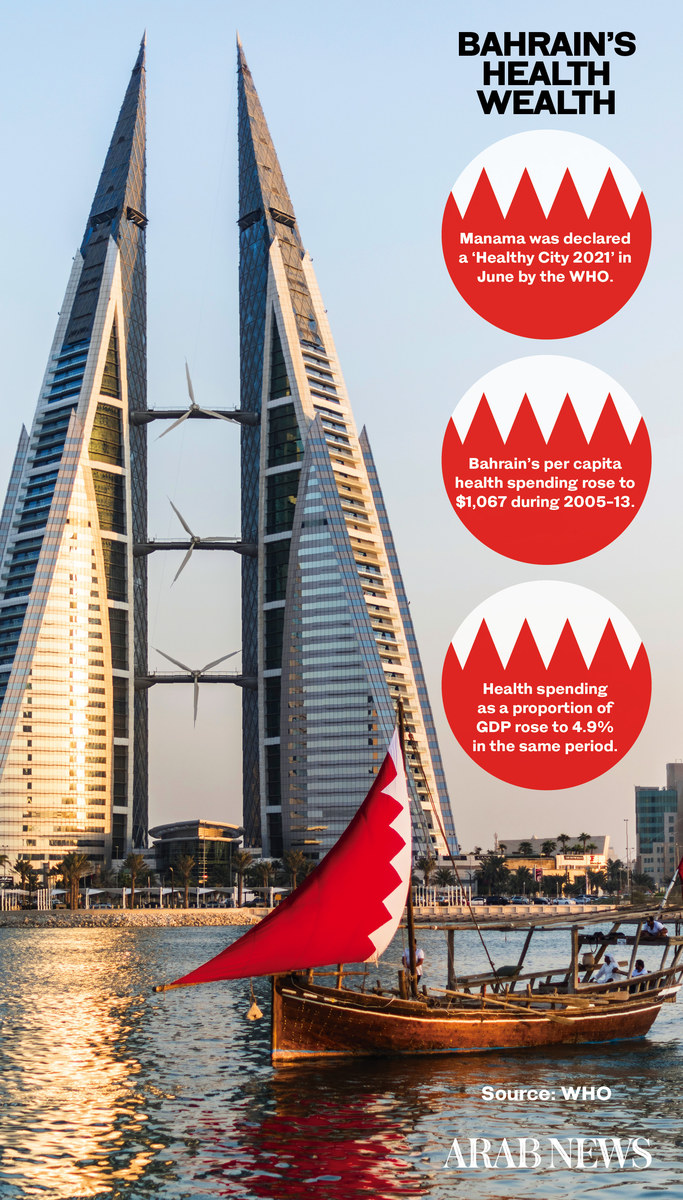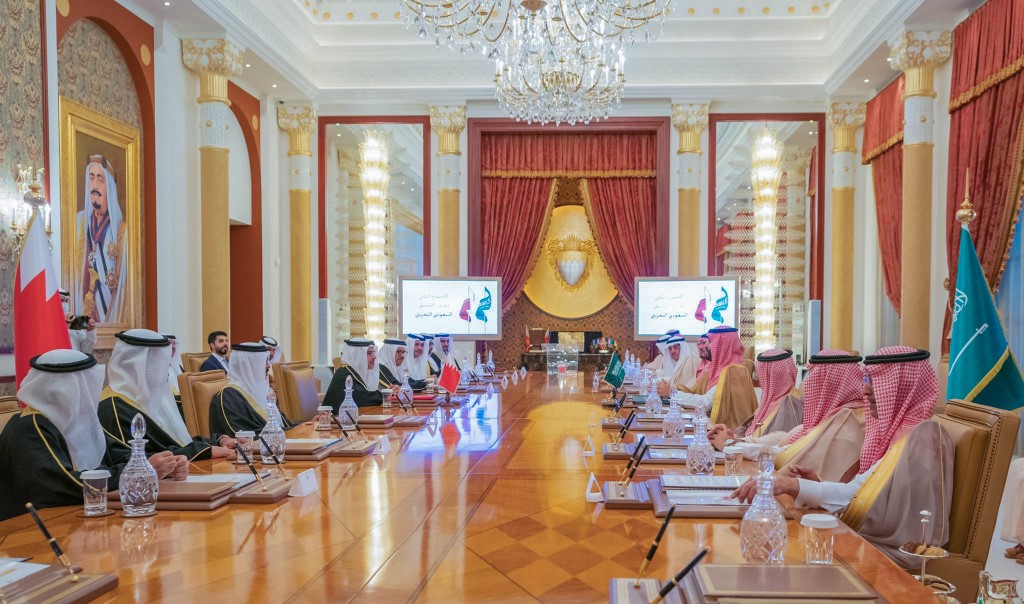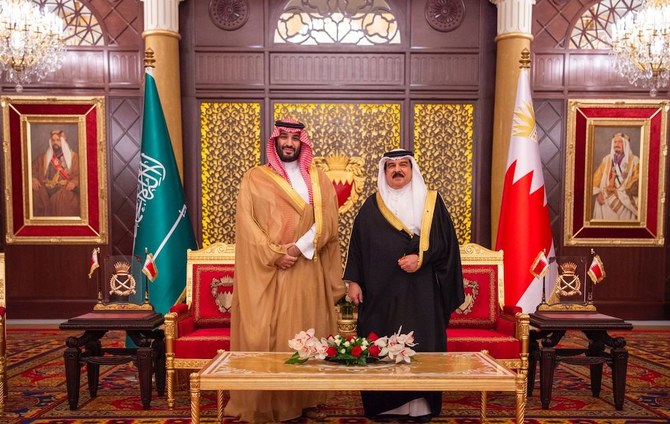RIYADH: Saudi Crown Prince Mohammed bin Salman’s visit to Bahrain, his latest stop on a tour of the Gulf states, is expected to cement ties between the two kingdoms, with both witnessing strong reciprocal trade and a burgeoning tourism sector.
Ahead of the visit, Saudi Arabia’s King Salman sent a written message to Bahrain’s King Hamad regarding bilateral relations, and ways to support and enhance ties between the two kingdoms, Saudi Press Agency reported on Sunday.
The message was delivered by Prince Faisal bin Farhan, Saudi Arabia’s foreign minister, during a meeting with his Bahraini counterpart, Dr. Abdullatif Al-Zayani, in the capital, Manama.

Saudi Arabia’s Crown Prince Mohammed bin Salman and Bahrain’s ruler King review historical and fraternal relations between the two countries and ways of enhancing cooperation. (Saudi Press Agency)
During the meeting, Prince Faisal conveyed King Salman’s greetings to King Hamad, and his wishes for continued progress and prosperity for the kingdom and the Bahraini people.
Saudi Arabia, the largest GCC market, is just 40 minutes from Bahrain via the King Fahd Causeway, and has long ranked first among countries receiving Bahraini exports, importing goods worth $140 million in October 2021 alone.
The UAE was second that month, with $98 million, and the US third, with $87 million, according to the foreign trade report from Bahrain’s Information and eGovernment Authority.

The King Fahd Causeway is among the most significant construction achievements in the region. Since its opening in 1986, it has helped to strengthen relations between Saudi Arabia and Bahrain. Around 390 million users have traveled along the causeway since it opened.
The two kingdoms have long enjoyed fruitful economic ties. Tourism and trade links between Bahrain and Saudi Arabia grew 43 percent year-on-year in the third quarter of 2020. And the reopening of the causeway in March 2021, following its lengthy closure at the height of the global pandemic, has given the two economies a significant boost.
Forecasts suggest the reopening of the causeway has contributed $2.9 billion to Bahrain’s economy this year, based on average tourism spending in 2019, according to the Bahrain Chamber of Commerce and Industry.
Bahrain attracted nearly 11 million visitors, including 9 million tourists, in 2019. Saudis accounted for 88 percent of Bahrain’s visitors, with most traveling via the causeway.
Although trade between Bahrain and Saudi Arabia has continued throughout the pandemic, tourism has been severely affected. To aid the post-pandemic recovery, the two kingdoms closed ranks in the fight against COVID-19.

In November, the Information and eGovernment Authority and the Saudi Data and Artificial Intelligence Authority signed a memorandum of understanding to launch a “health passport,” which ensures that citizens and residents traveling between Bahrain and Saudi Arabia meet criteria set by both countries to combat the virus.
The pandemic response is not the only example of the two countries working together. They routinely coordinate their actions under the umbrella of the GCC in accordance with the bloc’s common visions and strategic goals, with a view to achieving integration between member states in different fields.
A similar cooperative spirit informs their roles at the Arab League, the Organization of Islamic Cooperation, the UN and various international bodies.
After a period of turbulence, Bahrain’s economy has vastly improved in recent months thanks to a package of fiscal reforms aimed at improving non-oil revenues, and cutting state spending and support from its regional allies. In November, S&P Global Ratings revised Bahrain’s outlook to “stable” from “negative.”

Bahrain’s Crown Prince Salman bin Hamad, left, with Saudi Arabia’s Crown Prince Mohammed bin Salman and his delegation during a meeting in the capital on Dec. 9, 2021. (Bahrain News Agency via AFP)
Bahrain’s public debt climbed to 133 percent of gross domestic product last year from 102 percent in 2019, according to the International Monetary Fund. S&P forecasts Bahrain’s budget deficit, which was 16.8 percent of GDP last year, to average 5 percent between 2021 and 2024, excluding the impact of a possible hike in value-added tax.
Rated below investment grade in 2018 owing to a credit crunch, Bahrain received a combined package of $10 billion from Saudi Arabia, Kuwait and the UAE.
That money was linked to a set of fiscal reforms, but after the COVID-19 crisis strained its finances, Bahrain in September postponed plans to balance its budget by two years and announced plans to increase a value-added tax.
“The Bahraini government recently announced additional fiscal reforms to strengthen non-oil revenue and rationalize expenditure. These measures, along with the more supportive oil price environment, should improve the sovereign’s fiscal position,” S&P said in a statement.
The agency said it expects the government to benefit from additional financial support from its Gulf allies, if needed.
In numbers
• Saudis make up 88 percent of Bahrain’s visitors
• Bahrain attracted 9m tourists in 2019
Saudi Arabia, Kuwait and the UAE recently reiterated their support for Bahrain’s plans to balance its budget, a move expected to help the country in the debt capital markets despite delays in plans to fix its heavily indebted finances.
This does not mean Bahrain has lowered its ambitions. In November, it announced plans to invest $30 billion in over 20 new projects, with the construction of five new offshore cities, according to Bahrain News Agency.
The strategic project plan will see infrastructure development, including a new causeway connecting Bahrain to Saudi Arabia. Bahrain will also establish a 109 km metro system, the 22.5 km Northern Road. The strategy is designed to create jobs and boost economic growth in Bahrain.
Bahrain also aims to increase oil refining capacity from 267,000 to 380,000 barrels per day through its Bapco Modernization Program, the largest industrial project in the kingdom’s history.
















